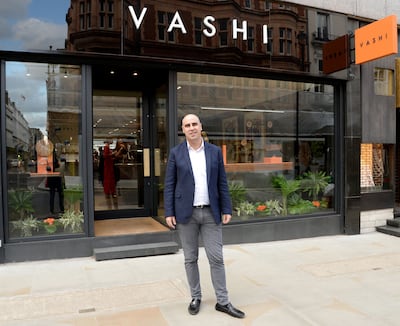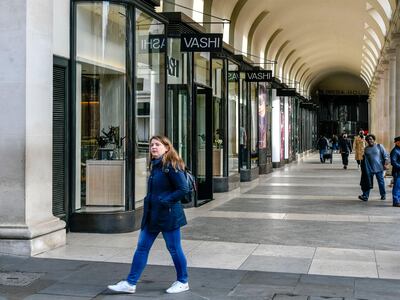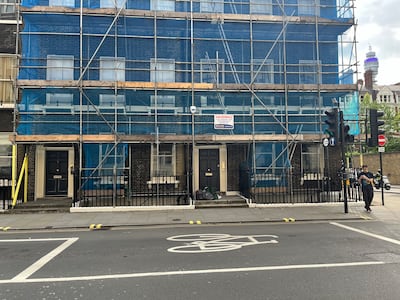Vashi Dominguez was a man on a mission to reshape the world of jewellery in his own larger-than-life image.
A gift for self publicity had landed him a spot as the resident diamonds expert on This Morning, a popular TV show in the UK, fastening glistening necklaces around the neck of the then-presenter, Holly Willoughby.
Buoyed by his own hype, the Canary Islands-born businessman set out to create one of the world’s biggest luxury brands on the back of a £200 million diamond hoard used to lure investors to his diamond company.
But just a few years later, the 45-year-old’s business has collapsed, the chain of central London emporiums shuttered and he is now nowhere to be found.
Just over a year after that collapse, The National can now reveal that diamonds used to seek out £75 million in investment in the company are long gone, as is the chain of stores and internet presence he touted as transformational to the industry.
In one appearance with Willoughby, Mr Dominguez casually fitted a £500,000 diamond necklace. He proceeded to wrap an equally expensive bracelet made of hundreds of diamonds and rubies on her wrist.
That was as well as “very cheap” chandelier earrings at £50,000, an art deco ring at £200,000 and a £100,000 tennis bracelet.
“They always look good on you,” he said.
With the help of investors and former employees, as well as leaked documents and court records, The National has been able to piece together how Mr Dominguez was able to raise millions to fuel his global ambitions and the chaotic final months before they crashed to earth.
Investor fury
Investors who lost money, many of whom are from the Middle East, are demanding the UK authorities investigate Mr Dominguez to discover what really happened to the assets.
Liquidator Teneo says it has not seen “any evidence” of the stock the firm stated it possessed, in audited accounts it filed with Companies House. Teneo in fact found just £114,000 of worth.
Teneo also says it has not been provided with any proof the stock existed “at any point in the company's history” at the levels it claimed.
All the investors The National spoke to tell of a chief executive and a company with a buzz about them.
Among those reported to have backed the company are Nick Wheeler, founder of the shirtmaker Charles Tyrwhitt; Sinclair Beecham, the co-founder of sandwich chain Pret a Manger, and William Jackson, chief executive of London-listed private equity firm Bridgepoint. They have been approached for a response.

Michael Moszynski, founder and chief executive of LONDON Advertising and an experienced investor, was introduced to Mr Dominguez by a fellow investor in a separate business.
He explained Mr Dominguez’s reputation – being an Entrepreneur of the Year finalist, tipped by Forbes magazine, with the backing of high-profile investors – made Vashi an attractive proposition.
The senior management team also included figures with strong track records in retail, which gave him confidence. Audited accounts suggested it had healthy assets and revenue.
“I went to see their store and they were just about to open this amazing shop in Covent Garden. It all looked really strong,” Mr Moszynski said.
“The quality of the investors was reassuring and everyone thought everyone else had done their due diligence. Some of the investors who lost their money were top names in British entrepreneurship.”
A Middle East investor, who has a background in the retail business and spoke anonymously, told The National he was attracted by Vashi's approach which “had a lot of merit to it”.
He was impressed by the “brazenness” of stores in high-profile locations in central London.
“I was invited to the opening of the Covent Garden one and they walked us around, and it was busy and buzzing,” he said.

He put together a consortium, which included friends, family and his employers, spread across the Gulf and Saudi Arabia, to invest in Vashi.
The consensus was that if investment went wrong “at least we had the diamonds”, he said. “That was the insurance policy.”
He feels “taken in” by Vashi’s story.
“I'm involved in many companies that haven't made it. They fail, but they fail on their merits,” said one frustrated investor from the Middle East, who wished to remain anonymous. “This feels different.”
Mr Moszynski said the fact the company was raising capital on the back of its diamonds, confirmed by auditors, convinced him to invest.
“That was a major, major reason why investors put in money. They felt even if the business wasn't successful, the liquidation of the assets would offset the investment,” he said.
“But we investors discovered that there was no stock when we heard that the liquidators had opened the safe and it was bare.”
Vashi’s vision
Mr Dominguez was born to a Spanish mother and Indian father on the island of Tenerife.
His insurance broker parents sent their only child to a private school and he went on to study law.
He dropped out, becoming a salesman at an electronics store and in the process finding his passion for business.
Mr Dominguez opened his own shop in 1998, then set himself up as a wholesale supplier of electronics to the Canary Islands, travelling to Hong Kong to deal directly with manufacturers.
Tiring of electronics, he decided to turn a childhood fascination with diamonds into a moneymaking venture.
Meteoric rise
It’s a difficult business to break into, but after 100 meetings over nine months he managed to find a gems supplier in Mumbai and he was on his way.
After first selling them wholesale in his native Spain, he decided it would be more beneficial to market them online directly to customers.
Mr Dominguez moved his business to London in 2007, setting up its headquarters in the Hatton Garden diamond district. His company Diamond Manufacturers Ltd rebranded to begin trading in his own name, Vashi, and in 2009 his website was up and running.
He opened his first bricks and mortar store in the upmarket Mayfair district of the UK capital.
This led to media coverage and the regular slot on This Morning giving tips about buying precious gems.
Buoyed by his initial success and enhanced profile, he set out his vision for conquering the jewellery world, aimed at luring millennial and Gen Z customers to “iconic destination stores”, stocked with ethically-sourced diamonds.

He expanded to three more stores, with the flagship a dazzling 4,476-square-foot presence in Covent Garden. Each of them dovetailed with a bespoke online service.
Rather than intimidating destinations only for the super-rich, these would be “friendly and accessible”, with in-house workshops visible from the street that would tailor-make jewellery to embrace “the fundamental emotions of the wearer”.
Material for investors showed young photogenic customers, smiling as they engage in the diamond ring-buying “experience”.
John Ames joined Vashi as chief technology officer in July 2021 and his first impressions of Mr Dominguez were positive.
“He was a big man – imposing and tall. He was impressive,” Mr Ames told The National.
“He turned up to the meeting with a £60,000 gold watch on his wrist and he spoke eloquently about his vision.”
Meanwhile, Mr Dominguez was a finalist in the Ernst and Young Entrepreneur of the Year award, while Forbes magazine predicted Vashi would be among the UK’s next “unicorns” – a privately owned start-up company valued at over $1 billion.
The company recorded apparently dramatic increases in sales. A trading update issued in May 2021 stated that sales were up 385 per cent from the year before, when the UK was in lockdown due to the Covid-19 pandemic.
Mr Dominguez laid out plans for expansion into the US, saying the $300 billion jewellery industry was “ready to be disrupted”.
“Within five years, we expect to join one of the world’s biggest luxury conglomerates, and we will begin our global roll-out thereafter,” the company boasted.
A 2021 pitch seeking £75 million from investors set out a bold plan to use the capital to fit out New York stores and also to buy £50 million worth of stock.
The New York stores were to be on Fifth Avenue and in SoHo, where its premises were to be opposite Tiffany & Co and adjacent to Cartier, Louis Vuitton and Apple.
Vashi’s chief financial officer, Charles Leach, emailed potential investors to say the company was valued at £250 million with fixed assets in the form of loose polished diamonds and metal worth up to £200 million.
The unravelling
Mr Ames, the chief technology officer, suspected all was not right when suppliers began seeking overdue payments.
By December 2021, he had reason to believe that the company was raising investment on the basis of sales figures he felt did not match reality.
Mr Ames was given an internal sales report, which showed the figures were around £5.4 million for 2020 and £5.09 million for 2021.
That contrasts with the last available public accounts filed with Companies House, which show that the company’s stated sales for the year ending 2020 were £53.63 million and 2021 £105.42 million.
The company made a pre-tax profit of £14.1 million in 2021, according to the filing for that year, up from £4.9 million the year before.
The accounts were signed off by Inger & Co, which operates out of a small office among shops in the East London suburb of Redbridge.
Mr Ames says when he challenged a fellow senior manager about the discrepancy, he was told the rest of the sales were made up of Mr Dominguez’s private sales to celebrities and other wealthy clients.
However, a presentation to investors states that revenue were split 62 per cent online and 38 per cent in stores. There was no mention of private sales.
It just “didn’t make any sense”, said Mr Ames.

From his conversations with Vashi employees involved in the purchase of precious metals and diamonds, Mr Ames understood those suppliers continued to chase the company for unpaid bills and were unwilling to allow the business to purchase on credit.
Other conversations, including with employees who worked in the stores, where diamonds were kept in safes, revealed that the necessary stock was not being bought.
He said he was “uncomfortable” with what was taking place.
Mr Ames began to raise concerns about a lack of internal governance and internal reporting but in January 2022 he was dismissed.
Former chief financial officer Mr Leach had by this stage put his own money into the company.
He told The National: “As an investor myself who lost a substantial sum, I relied like other investors on audited accounts, audited stock certificates and independent professional stock valuations.
“I was retained by the company as an external consultant, preparing investor forecasts from management accounts provided by the accountant, and communicating their vision to their investors.
“I never saw a bank statement or any internal sales or customer information. The business appeared to be a great British success story with an inspiring leader, and I put my heart into helping them tell their story.
“The sudden liquidation and the picture that emerged following it were a huge shock.”

Creditors, including diamond suppliers, had gradually lost patience, and court records show they were petitioning to have the company wound up from May 2022.
A former employee revealed on the Glassdoor employment website, which reviews companies, that staff were made to pretend to be customers in November 2022.
Other employees wrote on Glassdoor of unpaid salaries, pension contributions taken out of wages but not paid into pension funds, and having to lie to customers about their orders.
Meanwhile, furious customers complained about the shambolic service, with one saying Vashi had taken more than a year to replace a faulty ring.
The company was finally wound up in April 2023 after the Canary Wharf shopping centre, the landlords of one of its premises, and 19 other creditors, obtained a court order.
The liquidators say there are claims totalling £162 million from creditors, while staff are owed £2.5 million and the tax authorities £4.6 million.
Reflecting on his time at the company, Mr Ames said: “I hated the fact I was deceived. It made me very angry that other people were being recruited into it and deceived as well.
“They were young and very talented and they all believed in the concept and wanted to deliver on it.”

The person most able to answer questions about the company is of course Vashi Dominguez himself.
Efforts to contact him to seek a response to the allegations made have so far been unsuccessful. It is understood investors have also been trying to track him down.
At his last registered residential address in central London, a woman who answered the door when The National visited denied knowing who he was.
Mr Moszynski said he has now made a complaint to the UK’s Serious Fraud Office with a detailed dossier of evidence.
The SFO told The National its policy was to “neither confirm nor deny” whether it was looking at a case until it was officially announced but said criteria for investigating included “cases that involve millions of pounds”.


